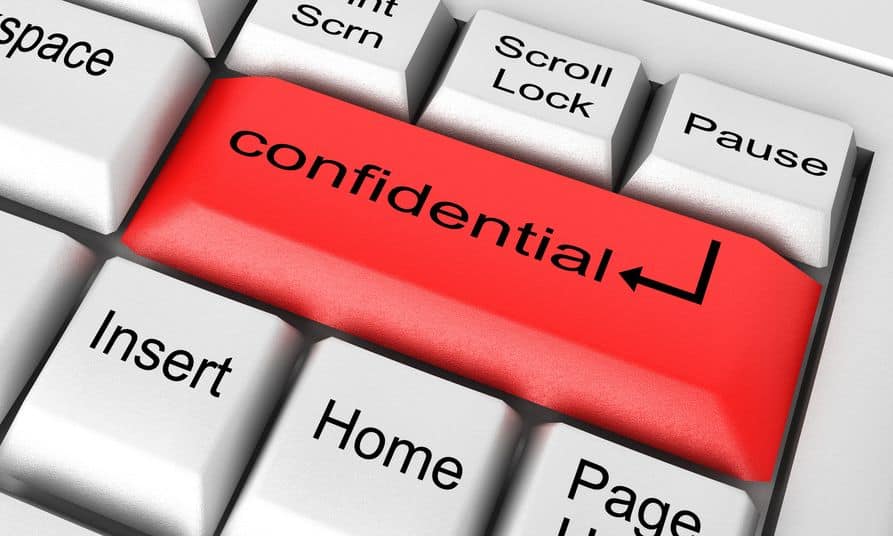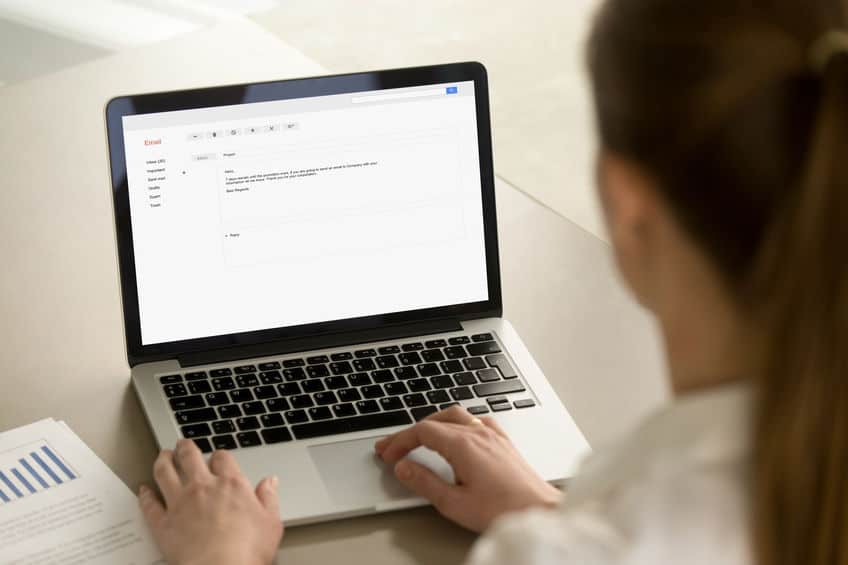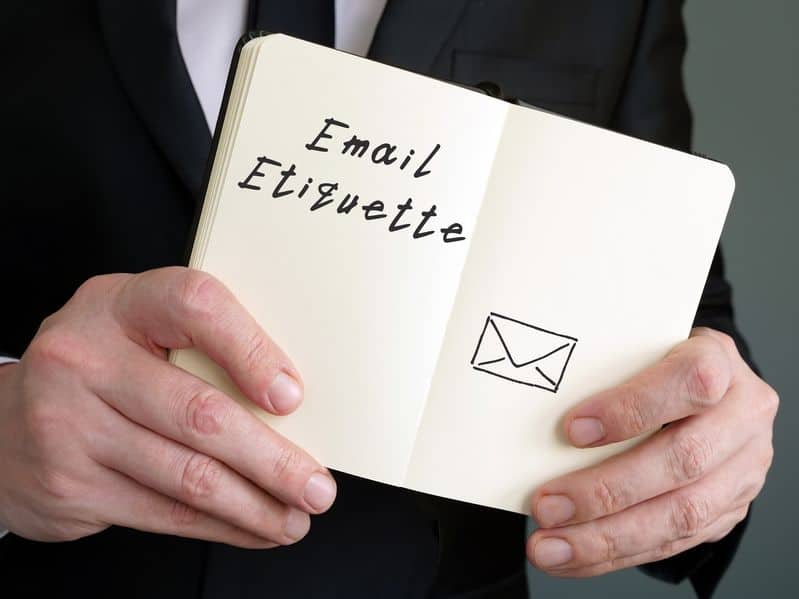Most jobs will give you an employee email account to use for work-related emails. This leads to a lot of employees to wonder if their email is private and protected, or if they should be concerned about who is reading their emails.
Are Work Emails Confidential? Unfortunately, your work email is not confidential. In most places, employers are legally allowed to monitor what happens with this type of communication. Most companies will inform you that they can manage your work emails. Even if they do not include that information, they are still able to read your emails because it is part of their company account.
There are quite a few reasons why companies can view your emails, and most likely its not because they are nosy. Let’s talk about why they can read them, what you should do with your company email, and how it can get you into trouble.
Are Work Emails Confidential?

If you have a specified work email or use a computer-issued device, your employers are legally allowed to read your emails. Employers have access to your emails as a way to protect the company and you from any sort of liability. These emails create a paper trail that the company can use.
If you are sending confidential emails through the system, those are not safe from your employer, either. The “Confidential” word in the subject line is often overlooked. If you are using your personal account on company equipment, your employer may be able to read your emails in certain circumstances. The device you are using may automatically save the information because it cannot tell the difference between your personal account versus your work email.
Companies reserve the right to monitor the activity that goes on in regards to their reputation and security. The work emails you write are confidential to anyone outside of the company, as it should be — the line between what you can send and what you cannot sometimes get blurred. Knowing your companies’ policy in terms of data protection will help you avoid any severe HR issues down the road.
Why Can Employers View Your Emails?
Companies don’t care about that email to your grandmother, but they are concerned with the privacy and security of their company. Devices that have the ability to connect to the internet are at risk for breaches at any time. A company needs to know what is being said under their name, as well as where it is being shared.
When you were hired, you probably signed a policy agreement which explained how you could use your work email and company issued-equipment. There is most likely a clause about how your employer has access to your information. These policies may affect your personal email account as well.
Your emails are not the only thing to be monitored while you are using company equipment. They can log everything you type, what you are browsing for on the internet, and access your social media accounts if you have logged into one.
Companies collect this data as a sort of paper trail to use in the future. If you or the company fall into legal trouble, having these emails from various employee accounts can protect them for liability or even an outage or breach that could delete relevant data.
How Can Employers Monitor Your Email and Computer Use?

There are multiple ways a company can see what you are doing, how long you are doing something, and every single word you type into the computer. IT departments are usually in charge of these tasks and install software that saves your emails, documents, and search history.
Using remote computers on the same network, your employers can tune into your computer screen to see what you are doing. They are also able to see how long you have been working on something, or how long your computer has been idle.
Keystroke monitoring is used in a variety of industries. These programs or devices can log every single button that you press on your computer. It can show how productive you are while at work, but it also puts your private information at risk. Since it does not know the difference in what is work-related and what is not, your passwords, emails, and logins may be at risk.
If you work at home on a company portal or a company-issued device, the same rules apply as if you were in a typical job environment. If you use a personal computer to work from home, make sure you have clearly defined your work email versus your private account. You also should make sure you never send a business email through your private email.
Can Employers Monitor Your Private Email Account?
Personal email usage is a hot topic for many companies. Most of us have a personal email account that we use to send emails to friends and family, shop online, and manage private affairs such as health or finances. Unfortunately, if you are logging in to your personal email on a company-issued device, your email can be subject to being monitored.
If you are using your personal email on your own phone or computer, your employer will have no right to view your emails. The Stored Communications Act restricts companies from asking for your passwords to personal accounts, including email and social media.
If you are looking for more information about the Stored Communications Act, the Legal Information Institute explains it well, read it here! When it comes to personal email on a company device, you should have been asked to give consent for the company to collect the data from your email.
The best way to avoid the monitoring systems in your company from capturing passwords or accessing your emails is to limit using your personal information all together on your company computers.
What are Your Rights as an Employee?
In most circumstances, the court system is going to side with the company when it comes to any communication in your work email, on a work device, or breaking company policy. Some companies have established boundaries with their employees as a way to protect their privacy. If your company allows for messages to be marked confidential or protect them with a password, your information is protected.
The Electronic Communications Privacy Act was established in 1986 as a way to prohibit intentional interception, accession, disclosure, or use of someone’s electronic communication. The exceptions to this law include company devices, content-related information, if companies receive consent, or if there is a serious business concern.
Although personal use may be allowed, it can cause issues at work. If you are using your work email for personal use too often, your employer could use that to monitor your work performance and use it against you.
What is the Chance of Your Employer Reading Your Email?

The real question is, how often are your employers actually reading your email? In most circumstances, your employer has more important tasks to handle. Companies are only going to heavily monitor your email for a specific reason related to the company.
If an employee is under scrutiny for behavior that goes against company standards, their emails may be monitored more than others. These can include anything from reduced work ethic, failed drug test, suspicion of stealing or even missing too many days.
SimplyHired surveyed 1000 employees and employers to see how often employers are actually checking the emails their employees send. The percentage of employees that thought their work email was being monitored was 72.4%, but only 52.4% of employers admit to checking their emails. You can read more about the study here!
Your Employer May Not Be The Only One Reading Your Emails
In public companies, most of the communication within the company becomes public record. Memos, drafts, internal and external correspondence, and official documents become part of government records. There are both state and federal laws set in place to make this information available.
In some states, any conversation you have concerning your job might be subject to public record. This not only covers your emails, but it can include texts that are sent on your personal device. If a court finds that the information is relative to how the public views the company, your emails and texts could be seen by anyone.
Not all of your emails or texts are going to be broadcasted. These messages will be examined for a specific topic, who they are sent to, when they are sent, and what is the primary purpose of the communication. There are actually retention rules that establish how long you should keep an email, just like you would keep a paper document.
- Short Term: These are temporary documents. This includes most of the emails that we send daily. These records of communication can be destroyed at any time since they are not as important.
- Long Term: These emails often have content that is relative to the company, but are not always needed. Once these have served their purpose, they can be deleted. If the documents contain day-to-day information, they need to be easily accessed and found within a database.
- Permanent: Most Likely, these emails contain valuable information in relation to a public business. These emails will most likely be in a protected database for the company to retain the information.
Could Your Job Be At Risk Over Emails?
The quick answer is yes! Your work emails, account, and computers are all property of the company. According to the American Management Association and the ePolicy Institute, half of the employees are fired because of email or internet problems. A lot of times, it can be easy to forget that you do not own your email.
Even if it is not particularly mentioned in the company’s policies, if you are sending emails about a topic that is either not work-friendly, illegal, or puts the company at risk, then you may run into some problems.
How Can You Protect Yourself?
The easiest way to keep yourself out of trouble is to keep your personal email and your work email separate. If you have to send a personal email while at work, send it on your personal phone during your break, this can keep your employers from reading about your personal life, and you can keep your job.
Knowing your rights like the ones mentioned above can go a long way for protecting your privacy and your job. You should also be fully aware of the policy on emails and devices at your company. This was most likely shown to you when you began the job, and most companies make you sign it. If you have questions about the policy, ask to see it again, or ask questions for clarification.
When writing work emails, you should always be using proper etiquette. Grammar, courtesy, and topic sensitivity work wonders. A great way to write emails is to write emails like the last person you want to read them is going to read them. Writing this way can keep your content focused on work-related topics.
What is Proper Email Etiquette?

When considering what to send in a work email, there are a few things to remember. What you put into your work email could result in additional stress on you, coworker issues, or even the possibility of you losing your job altogether.
Things To Avoid in Your Work Emails
- Gossip: This should be a given, but it is one of the most popular reasons why you may get called to HR out of the blue. While gossip is not something you should be doing, if you choose to, do outside of your work email, and even your work environment. You are there to do your job, nothing else.
- Inappropriate Content: The workplace is usually not the place for your religion, political, or social views. There are very few jobs where these topics are acceptable, and they can go against your company policy as well. Your work email should be PG at the most.
- Confidential Information: Now that we know your work emails are not private, you should not be sending sensitive or classified information through your work email account. You won’t know who is reading your email, and that information could be a security issue for the company or a privacy issue for another employee.
- Criticism or Bad News; If you are delivering any bad news to an employee or a coworker, you should always do it in person. Again, this is a privacy concern, and it can be considered rude to the individual who is the recipient of the news.
- Personal Information: Your company has privacy policies set in place to protect them, but also to protect you. Avoid putting personal information in your work email because you never know who is reading it.
- Memes, Videos, Images: Unless you are sending an image or video that is work appropriate, try and keep your humor strictly to personal use only.
Things to Remember When Writing a Work Email
- Nothing is Private: If you have any information that you do not want someone else reading, then you should not be putting it in your work email. One of the best ways to make sure your work email is acceptable is to ask yourself how it would look on a public platform.
- Be Professional: In case you forgot, you are at work. When sending work emails, make sure that you are organizing your email in the proper format. Have an introduction, use correct salutations, and always close the conversation.
- Be Brief: Work emails should be shorter responses if you are able to. Sending documents, establishing meetings, or checking a quick fact are all suitable ways to use your work email. If you are writing a long email, it may be better to call or have a meeting with your coworker or boss.
- Check Your Tone: Emails are one of the most popular forms of communication in a professional setting. Unless you check the tone of your email, it could come across wrong to the recipient. A tone that is too negative or too light could make the email seem rude, or not as important as it may be.
- Use Direct Subject Lines: One of the best practices when sending work emails is to make sure the subject line makes sense. Most people receive multiple emails throughout the day, and a clear subject line can help them determine the level of importance.
- Use Proper Grammar: When sending work emails, you want to be sure that you are using proper grammar. Check your punctuation, spelling, and your sentence form before you hit send.
